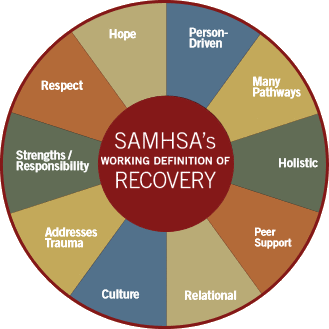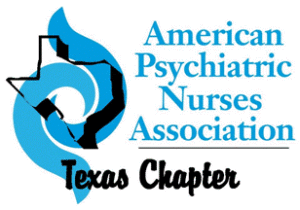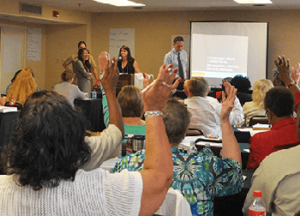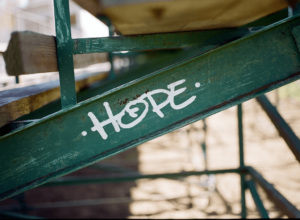
The Practice of Recovery
Inside this story:
- There is always hope for recovery and studies show that the recovery model is critical in improving outcomes in mental health and wellness.
- The shift from a medical model of treatment to recovery-oriented care is still relatively new and, though there are national-level Recovery to Practice curricula for six behavioral health disciplines, many have yet to implement it.
- In 2015, the Hogg Foundation awarded grants to support six behavioral health disciplines to bring the Recovery to Practice initiative to Texas, one of which went to the American Psychiatric Nurses Association (APNA) Texas Chapter.
- For the APNA Texas Chapter, translating the recovery-oriented curriculum into practice includes in-person training, content tailored to the audience, and intentional integration in organizational culture.
- Using the Recovery to Practice curriculum, the APNA Texas Chapter is changing the way nurses and other providers care for patients with mental health issues.
“Lucy, I remember so well. She had bipolar 1 disorder and was on medication. Well, she was supposed to be, but she would not stay on it. She kept relapsing and coming back to the hospital. ‘You know better,’ I’d say. ‘Do what we tell you. It’s for your own good.’ Now, I look back on that and wonder what I was thinking. In Lucy’s mind, she must have been asking ‘You want me to take medicine that is going to take away my natural high? You want me to give that up so I can be ‘normal’ and in exchange, you’ll give me pills with side effects of weight gain and sexual dysfunction?’ I don’t know if I would have taken my medicine either!”
Allyn Collins is a registered nurse and clinical educator for psychiatric services at Parkland Health & Hospital System in Dallas. She’s been in the psychiatric nursing field for 30 years and, until recently, never questioned the way things were done. “I didn’t think people could recover from mental illness, especially with diagnoses like schizophrenia or bipolar disorder,” she explains. “I was taught – back in the day – that you just weren’t going to get better. I’m sad to say that as a nursing professor that is the same kind of attitude and misinformation I gave to students, but that information was faulty and incomplete.”
For many years, individuals who identified as having a mental illness were merely “treated” with no hope of a better life. Their basic needs may have been met – food, housing, sometimes medication – but with no goal of improvement or recovery. However, there has been a shift away from a medical model of treatment to recovery-oriented care, which focuses on instilling hope, connecting people to peer support, self-directed symptom management, and other recovery principles.

- There are many pathways to recovery.
- Recovery is self-directed and empowering.
- Recovery involves a personal recognition of the need for change and transformation.
- Recovery is holistic.
- Recovery has cultural dimensions.
- Recovery exists on a continuum of improved health and wellness.
- Recovery is supported by peers and allies.
- Recovery emerges from hope and gratitude.
- Recovery involves a process of healing and self-redefinition.
- Recovery involves addressing discrimination and transcending shame and stigma.
- Recovery involves (re)joining and (re)building a life in the community.
- Recovery is a reality. It can, will and does happen.
Source: CSAT White Paper: Guiding Principles and Elements of Recovery-Oriented Systems of Care
At the national level, the fields of psychology, psychiatry, nursing, social work, peer support and addiction counseling participated in the Substance Abuse and Mental Health Services Administration’s (SAMHSA) original Recovery to Practice (RTP) initiative and developed curricula to fit their respective professions. The goal of the Hogg Foundation RTP initiative is to support the dissemination of the national curricula across these six behavioral health professions in Texas. RTP helps behavioral health and general health care practitioners improve delivery of recovery-oriented services, supports and treatment.
“There is recovery. People go on to lead good lives. And infusing that mentality into mental health care is critical to the success and well-being of individuals with mental health needs.”
In 2015, the Hogg Foundation for Mental Health awarded grants to support the six behavioral health disciplines in bringing the RTP initiative to Texas. With these grants, Texas became the only state to disseminate the national-level RTP curricula. This story features one of the six disciplines – nursing – and what they’ve accomplished with the RTP grant.
Recovery in Mental Health
 The American Psychiatric Nurses Association (APNA) Texas Chapter was one of the six grantees to receive funding from the Hogg Foundation. “We knew the practice of recovery was sporadic in mental health nursing,” says Dr. Patricia Black, the associate director of APNA and national director for the APNA RTP program. “In any other part of the hospital system, if you had a condition, you would seek help within the health care system expecting that you would recover. But that wasn’t necessarily being promoted in mental health.”
The American Psychiatric Nurses Association (APNA) Texas Chapter was one of the six grantees to receive funding from the Hogg Foundation. “We knew the practice of recovery was sporadic in mental health nursing,” says Dr. Patricia Black, the associate director of APNA and national director for the APNA RTP program. “In any other part of the hospital system, if you had a condition, you would seek help within the health care system expecting that you would recover. But that wasn’t necessarily being promoted in mental health.”
Ms. Collins points to several factors in this discrepancy. For one, mental illness is “too close to home.” When a nurse sees a patient who has experienced a heart attack or has diabetes, it’s easy to distance oneself. When it comes to mental illness and substance use – depression, anxiety, alcoholism – you know you are vulnerable and put up barriers. In addition, nurses feel a need to fix people. Being able to solve the issue takes away some of the fear of an illness. “But with mental illness, there are no black and white answers. We still don’t have a clear-cut picture; you can’t do an MRI or run tests to get a definitive answer.” It can be scary and intimidating, and adds a layer of complexity to the nursing practice.
The recovery model is critical in improving outcomes in mental health and wellness. APNA collaborated at the national level with peers and psychiatric-mental health nursing leaders to promote recovery, and to develop curriculum and training materials to increase nursing knowledge of recovery-oriented care and how it translates into practice. There were several key measures for ensuring the success of this program for the psychiatric nursing field.
In-Person
The original intent was to disseminate the content as quickly and conveniently as possible, which lent itself to an online course. However, APNA quickly heard feedback that the course needed to be presented in person. Nurses expressed a need to meet face-to-face to talk through some of the sensitive issues around recovery and how to work with patients. What resulted was a live program that can vary in format or size.
 When considering the audience for the training, APNA identified nurses working in acute psychiatric inpatient settings since that’s where many people first come in contact with the mental health care system. This is also where students gain a lot of experience and is a good introduction to a recovery-oriented mindset. “We want them to learn from the day they walk into their clinical experience that recovery is not only possible, but also probable,” says Dr. Black.
When considering the audience for the training, APNA identified nurses working in acute psychiatric inpatient settings since that’s where many people first come in contact with the mental health care system. This is also where students gain a lot of experience and is a good introduction to a recovery-oriented mindset. “We want them to learn from the day they walk into their clinical experience that recovery is not only possible, but also probable,” says Dr. Black.
APNA quickly realized that this in-person format led to a richer dialogue among participants. Nurses began to share their personal experiences with mental health challenges and discussed the day-to-day practices and policies that could be changed. They began asking: “Why do we do it this way?” and “Is this person-centered?” Using a recovery approach became foundational in their practice and helped them meet expectations for proficiency in psychiatric-mental health nursing competencies.
Ms. Collins adds, “A good nurse is focused on self-assessment and understanding yourself and your belief systems. The RTP curriculum encourages you to think, ‘What do you believe to be true?’ and opens your eyes to the fact that recovery is possible. You don’t know what you don’t know. But once you know, you can alter your attitude.”
Tailored
The curriculum is built around fairly generalized principles, which allow it to work for nurses beyond the inpatient setting. The activities can be modified depending on the audience. Several of the facilitators incorporate optional activities and additional focus areas as they see appropriate. Dr. Celeste Johnson, APNA Texas Chapter RTP project director, RTP facilitator and vice president of nursing for psychiatric services at Parkland Health & Hospital System shares that “There are activities which can be tailored to the audience. For example, we share videos of psychiatrists in recovery when we present to psychiatrists. We share a video showing a patient’s experience in an acute ER when we teach ER nurses. We talk about incorporating recovery principles into plans of care no matter which discipline you represent.”
“The curriculum is pertinent to the care of people throughout the hospital. Every nurse is a psychiatric nurse. People with schizophrenia have heart attacks and people with bipolar disorder have babies. We see patients with mental health disorders in every specialty in healthcare.”
Infusing Recovery into Culture
“The ultimate goal of Recovery to Practice is to move away from the typical medical model,” says Ms. Bryan of the Hogg Foundation. As with Ms. Collins’ epiphany about Lucy, for many hospitals, the adoption of a person-centered approach means a dramatic shift in perspective and culture. Dr. Johnson describes how hospitals are now systemically infusing recovery and trauma-informed care into the culture, including everything from welcome letters for new patients to correcting stigmatizing language throughout the facility.
Parkland and UT Southwestern Medical Center-Zale Lipshy teach RTP to all behavioral health employees. Rebecca Deisler, an RTP facilitator, registered nurse and Clinical Manager for Psychiatry at UT Southwestern Medical Center, says they’re broadly disseminating parts of the curriculum throughout the hospital. She attends departmental and leadership meetings to discuss recovery-focused language and is influencing organizational development training for all employees.
Sending a Message of Hope
Ms. Collins tells a personal story highlighting the need for recovery: “I had a younger brother with multiple sclerosis (MS). It ended up taking his life, but we always had hope that he’d have a good life, in spite of his illness. Going through RTP helped me to look at the discrepancy between the way we view MS and mental illness. We knew MS was terminal. We knew eventually it would take his life. But that didn’t mean we lost hope. Why should we do that with people who have mental illness?”
During 2016 alone, the APNA Texas Chapter RTP facilitators trained 370 people in Texas, including mental health technicians, nurses, social workers, police officers and chaplains. They also trained 54 Texas facilitators who now present the program in their organizations. Faculty at a school of nursing have also taught components of the curriculum to 93 nursing students. Dr. Black says, “Nurses tell me this is how they want to practice and why they came into psychiatric nursing in the first place. For nurses new to the field, we’ve raised the bar and awareness.”
Fieldworkers trained
Organizational facilitators trained
Nursing students trained
A culture shift is occurring. Nurses like Ms. Collins are being challenged to adapt their beliefs and, importantly, their practices to provide better care for patients with mental illness. Hospitals are integrating recovery-oriented practices throughout the system, not just with nursing staff. In turn, patients are receiving a better standard of care and better outcomes.
Instead of approaching patients like Lucy with a ‘do what we say’ mentality as Ms. Collins described, we are shifting to a ‘what can we do?’ mentality. Nurses with a recovery mindset are asking: What can we do to help you achieve your goals? What’s working and what’s not? How can we help? And every individual in the system is better off for it.
“We’ve come a long way in a relatively short number of years,” says Dr. Black, “It shows how a small group of people can really build momentum in the workforce, and it doesn’t always have to come from the system-level down.”
 In 2010, APNA identified mental health recovery as a gap in nursing practice. That gap is closing. APNA has a vision of recovery as best practice for every psychiatric-mental health nurse in every treatment setting so that people experiencing mental health or substance use disorders can heal and grow.
In 2010, APNA identified mental health recovery as a gap in nursing practice. That gap is closing. APNA has a vision of recovery as best practice for every psychiatric-mental health nurse in every treatment setting so that people experiencing mental health or substance use disorders can heal and grow.
The APNA Texas Chapter has new leadership and their top priority is to promote the RTP initiative and take it to organizations throughout Texas that are interested in learning about recovery. By bringing the RTP curriculum to Texas, the APNA Texas Chapter is changing the way nurses and other providers care for patients with mental health disorders, giving people hope and expectations for a better future.
RELATED CONTENT
Recovery in Texas
The Hogg Foundation is committed to advancing the concepts and implementation of recovery across Texas and has multiple initiatives aimed at achieving this goal.
Recovery to Practice Grant Program
The goal of the RTP grant program is to support the dissemination of the RTP curricula across the fields of psychiatry, psychology, social work, nursing, peer support and addiction counseling in Texas.
Dr. Frese on Recovery: “Something Has to Be Done”
At 25 years old, Dr. Frese was diagnosed with paranoid schizophrenia. Since then, he has become a fierce advocate for the recovery movement.
